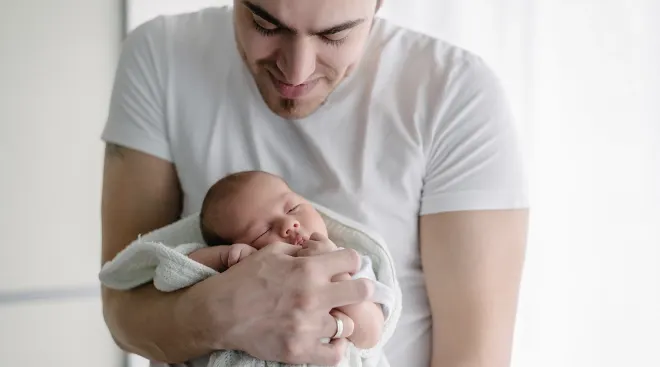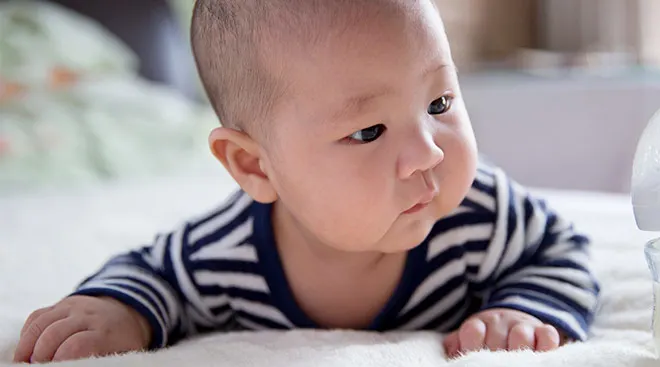- Pregnancy
- Baby & ToddlerRECOMMENDED READING
- Parents
- Getting Pregnant
- Baby Names
- Product Reviews
- RegistryRECOMMENDED READING
- Community
Newborn Baby

Hooray—baby is here! You waited months to meet your little one, and now you get to study their little face, stroke their tiny toes and begin to learn their likes and dislikes. You’re about to embark on a wild journey, full of excitement, adventure, challenges and reward—and we’re here to support you every step of the way. Wondering what to expect during baby’s very first week? Keep reading.
Growth
Although the first year of life is full of physical growth, it’s typical for babies, especially breastfed ones, to lose up to 10 percent of their birth weight in the first few days of life—so don’t be alarmed. This happens because infants are born with some extra fluid, which they shed after birth. Plus, it takes a few days for breast milk production to really kick in, which is a change from having a constant source of nutrition via the umbilical cord. Once your breast milk comes in, babies typically gain about an ounce a day on average. Unless you have serious concerns about milk production, there’s no need to stress out and weigh baby at home—the pediatrician will monitor and let you know how your newborn is progressing.
Emerging skills
Newborns have a ton of learning to do, and they can’t do much for themselves at this point. But babies are actually born with a bunch of innate reflexes (involuntary muscle responses to stimulation) that help them to thrive.
The rooting reflex, for one, helps newborns feed. If you stroke the corner of baby’s mouth, they’ll turn toward the side that you touched, in search of a breast or bottle. Babies are also born with the sucking reflex, so when the roof of baby’s mouth is touched, they’ll start to suck. (Note that because this reflex usually develops around 36 weeks of pregnancy, if baby was born premature, this reflex may be weak.)
If you stroke the palm of baby’s hand, they’ll close their fingers into a grip, thanks to their grasp reflex. If baby gets startled by a sudden movement or loud noise (including their own cries), they’ll throw their head back and extend their arms and legs out, then pull them back in, due to their startle reflex. And if you hold baby upright with their feet touching a solid surface, they’ll (at least appear to) take a few steps. Chalk that up to their walking reflex. Of course, it’ll be a while before your child really learns to walk—true first steps may happen between 9 and 18 months.
Feeding
Newborns have itty bitty stomachs, so they eat small amounts—but they eat frequently. Breastfed babies eat about half an ounce of colostrum (which is early breast milk) during each feeding session for the first couple of days after birth, and doctors recommend nursing “on demand,” meaning whenever baby wants—typically every two to three hours (and sometimes even more often than that!). Not only does this help ensure baby is getting enough to eat, but it’ll also help establish a solid milk supply.
Breastfeeding can be challenging, for you and baby alike, and it may take some time before the two of you get into the swing of it. Focus on getting a proper latch, and experiment with different breastfeeding positions to find what works for you. If it’s available to you, make use of the hospital lactation consultant, who can watch you nurse, make adjustments and offer helpful pointers.
If you’re formula-feeding, your newborn may eat about 1 to 2 ounces during each feed. Because babies tend to digest formula more slowly than breast milk, they can go longer in between feedings—about three to four hours. Of course, every baby is different, so watch for clues that they’re hungry (like rooting or smacking their lips) or full (getting distracted or turning away from the bottle).
During and after a feeding, don’t forget to burp baby! Any air they swallowed while eating can create painful gas bubbles; burping gets rid of excess air and helps cut down on spit up. You can drape baby over your shoulder and gently pat their back. You could sit baby upright on your lap, supporting their head and chest with your hand, and pat their back. Or, you could lay baby across your lap with their head turned sideways and pat their back.
Sleep
All that learning, growing and adjusting to life outside the womb is exhausting! Newborns sleep a lot—about 16 to 20 hours a day—and tend to be particularly sleepy in the first week or two as they recover from birth. But they wake frequently to feed, and often have their days and nights confused. There’s no semblance of a schedule at this point, and sleep patterns can be all over the place—and that’s normal.
It’s important to brush up on baby sleep safety. Put baby down for sleep on their back in a crib or bassinet, ideally in the same as room as you but not in the same bed as you. Their sleep surface should be firm and flat, and aside from a fitted sheet, there should be nothing else in their sleep area—no toys, pillows, bumpers or bedding.
Common ailments
Jaundice It can sound scary, but jaundice is super common in newborns. This is because the placenta removes bilirubin when baby is in utero, but once they’re born, their liver takes over, and it can take a few days for it to get the hang of things. Doctors check jaundice levels at the hospital, but it’s possible for it to make an appearance once you’re home. If you notice that baby’s skin or eyes have a yellow tint, give your pediatrician a call. They may send your child for a bilirubin test, and some simple light therapy may be needed.
Why does baby have puffy genitals?
You can breathe easy—it may have taken you by surprise, but it’s normal. Right before delivery, mothers experience a surge of estrogen, which crosses the placenta to reach baby. That excess estrogen can cause genital swelling in both boys and girls. Don’t worry—it’s harmless and will go away on its own in a few weeks.
I don’t feel a bond with baby yet—is that normal?
For some parents, they gaze at their newborn’s face and fall instantly in love. And for others, those feelings of attachment take longer to develop—and that’s completely okay. There’s no standard timeline for bonding with baby. It may happen in the first several days or even weeks after childbirth. Remind yourself that you’re meeting this new little person for the first time, and it can take a little while to get to know each other. Snuggles, skin-to-skin contact, making eye contact during feedings and talking to baby can all help nurture a healthy bond. And don’t forget to care for yourself as well; feeling tired, stressed and unsupported can make it harder to bond with your child. Accept help, and take breaks when you can.
Newborn skin
You may have expected baby to be born with smooth, perfectly unblemished skin, but the reality is that newborn skin is often pimply and peeling. You may see tiny, white bumps (known as milia) on baby’s forehead and cheeks; it’s just dead skin cells trapped in pockets on the skin’s surface and will disappear in a few weeks. Newborn acne, which manifests as small red pimples, may crop up on baby’s face and torso. Plus, the top layer of baby’s skin flakes off shortly after birth, so don’t be surprised if you see dry, peeling skin. Don’t pick at any skin imperfections—that could lead to infection and possibly scaring. Just keep baby’s skin clean and moisturized, using fragrance-free, hypoallergenic products.
Baby’s first well visit
Aside from the initial exam a pediatrician performs within 24 hours of birth, your first official well visit will be three to five days after birth. The doctor will weigh and measure baby, observe their behavior and perform a physical exam. Remember to bring the hospital paperwork, which contains information like baby’s discharge weight, any immunizations received and hearing and blood screening results. You’ll also want to bring a diaper bag with essentials like extra diapers and wipes, baby clothes, a bottle (if you’re formula-feeding) and a receiving blanket, since your newborn will be naked for the exam and may get cold. Be prepared with any questions that have come up in recent days (jot them down, so you don’t forget)—the pediatrician is there to guide you!
Feeling freaked out
You made it through pregnancy and childbirth, and now you’ve been handed a tiny human to care for. If you’re feeling a bit lost and overwhelmed, you’re not alone! Becoming a parent is a huge transition, and there’s bound to be a learning curve. But you’ve got this! Take it day by day. Read up on infant care, lean on your support systems, trust your instincts and don’t hesitate to reach out to your pediatrician with any questions.
As busy as you are taking care of your newborn, don’t forget about your own needs.
- Rest. Yes, we know it’s cliche, but it’s a good idea to sleep when the baby sleeps. Not only are you experiencing a severe sleep deficit, but you’re also still recovering from a major physical feat. Rest is imperative.
- Accept help. If you’re wondering how you’re supposed to get anything done around the house if you take the above advice, well, you’re not. If you’re lucky enough to have friends or family offering to help by cooking, cleaning or holding the baby so you can nap or shower, don’t be shy about accepting it—or even proactively ask for a helping hand.
- Postpartum recovery essentials. Whether the birth was vaginal or a c-section, your body has a lot of healing to do. Stock up on care items such as ibuprofen, maxi pads, postpartum underwear, a peri bottle, a sitz bath, witch hazel, ice packs and a postpartum belly wrap. There are also handy postpartum kits you can get, pre-stocked with everything you’ll need.
- Postpartum leggings. You’ll be spending a lot of time lounging around the house with your newborn, and a pair of leggings will no doubt become your go-to. But more than that, postpartum leggings help with circulation in your legs, ease groin and pelvic pressure, relieve discomfort from c-section and vaginal delivery wounds, reduce lower back pain and offer perineal and abdominal support.
- Burp cloths. You may have put a couple of burp cloths on your registry before baby arrived, but many new parents underestimate just how much newborns spit up. Make sure you’re well prepared with these top options.
You have plenty of time to help baby develop cognitive and motor skills. Right now, what your newborn needs most is to feel safe, secure and loved. Birth was a huge event for them too, and they’re still getting used to life outside the womb. This week, focus on snuggling, talking to them in soothing, slightly high pitched tones and strengthening your bond. Right now your face is the most interesting thing in the world, and nothing is better than your smiles and cuddles.
Please note: The Bump and the materials and information it contains are not intended to, and do not constitute, medical or other health advice or diagnosis and should not be used as such. You should always consult with a qualified physician or health professional about your specific circumstances.
Up to Date, Weight Loss in Infants Six Months and Less, October 2022
Stanford Medicine Children’s Health, Newborn Reflexes
Healthychildren.org (AAP), How Often and How Much Should Newborns Eat, August 2023
Mount Sinai, Breastfeeding vs. Formula-Feeding
Healthychildren.com (AAP), Why Babies Spit Up, October 2022
Stanford Medicine Children’s Health, Newborn Sleep Problems
Healthychildren.org (AAP), How to Keep Your Baby Sleeping Baby Safe, July 2022
Mount Sinai, Newborn Jaundice
Mayo Clinic, Infant Jaundice, January 2022
Healthychildren.org, 1st Week Checkup Checklist, September 2021
Mayo Clinic, What a Newborn Really Looks Like, April 2022
Eastern Health, Swollen Genitals (Infants)
American College of Obstetricians and Gynecologists (ACOG), Bonding With Your Newborn, January 2022
Hopkins Medicine, Newborn Skin 101
Cleveland Clinic, C-Section Recovery, October 2021
Learn how we ensure the accuracy of our content through our editorial and medical review process.
Navigate forward to interact with the calendar and select a date. Press the question mark key to get the keyboard shortcuts for changing dates.
Advertisement
Advertisement
Advertisement
Advertisement



















































